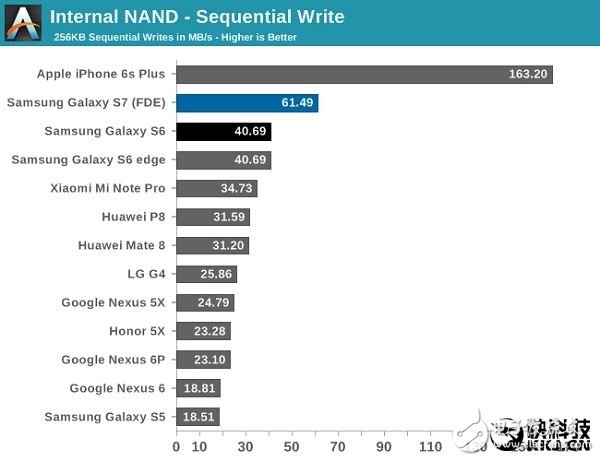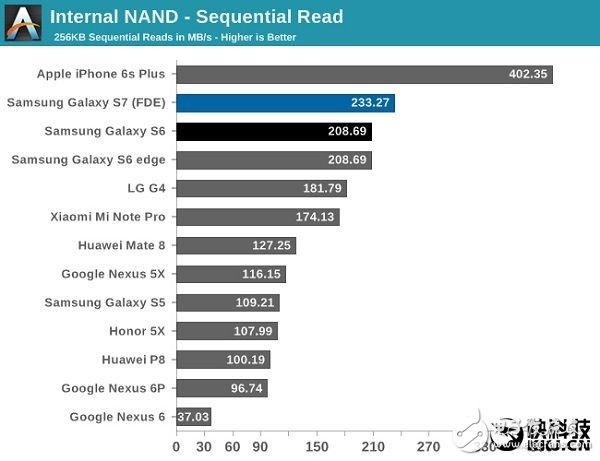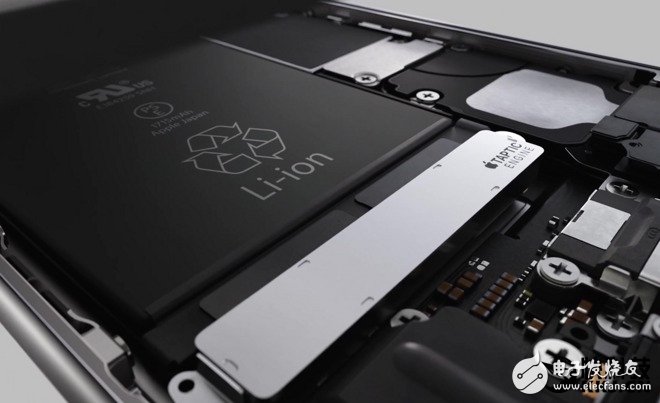Every year, we want to increase the speed of mobile devices and increase energy efficiency. I believe many people will focus on faster processors, more RAM, larger internal storage, and higher capacity batteries, but ignore some inconspicuous things like storage performance.
As a "hard disk" for mobile devices, manufacturers seem reluctant to talk more. But for the more real people, what is the gap between the popular Android phone and the iPhone? Foreign media AnandTech specially carried out more than ten devices including iPhone 6s Plus, Samsung Galaxy S7/S6/S6 edge, S5, Xiaomi Note Pro, Huawei P8/Mate 8/Glory 5X, LG G4, Google Nexus 5X/6P. The disk performance test.
Surprisingly, in the internal flash sequential read and write test, the iPhone 6s Plus is much higher than other Android competitors. In the continuous write test, the top three are iPhone 6s Plus (163.20 MB/s), Samsung Galaxy S7 (64.49 MB/s), and Galaxy S6 / S6 edge (tied 40.69 MB/s).
Samsung Machine King Note 7 is available worldwide! Compare iPhone 6S Huawei Mate 8
In the sequential read test, the top three are also these, including iPhone 6s Plus with 402.35 MB/s, Samsung Galaxy S7 with 233.27MB/s, and Galaxy S6/S6 edge with 208.69MB/s.
The iPhone 6s is so fast (compared to the iPhone 6) because Apple has changed the way memory is handled. According to AnandTech's detailed description, Apple chose the master of the amazing speed on the MacBook SSD, and then transformed it into the smart machine.
Samsung Machine King Note 7 is available worldwide! Compare iPhone 6S Huawei Mate 8
In addition, the report also mentioned that the iPhone 6s uses custom NAND flash and NVMe protocols instead of UFS or traditional eMMC. The 2015 models of the iPad Pro and iPhone SE also use the same storage type.
In the test, Apple's storage easily defeated the Galaxy S6 series with UFS 2.0 flash, even though the latter is quite fast. In February, Samsung announced that its UFS 2.0 technology has become faster and its capacity has increased to 256GB - up to 850MB/s for sequential reads and 260MB/s for continuous writes.
Unfortunately, in the AnandTech test, the company's latest Galaxy S7 and Galaxy Note 7 failed to break the record set by the iPhone 6s. At the "2016 Mobile and Internet of Things Forum" held this week, Samsung mentioned the significance of UFS storage for 4K/8K/VR content. Cho Hee-chang expects that by 2020, the number of connected devices will reach 50 billion.
UFS 2.0 and UFS 2.1 built-in storage (the theoretical speed of 1.2GB/s) used on products such as Galaxy S and Galaxy Note will increase to 2.4GB/s in the first half of 2018. In addition, Samsung also hopes to double the speed of UFS card v1.0 (the latest microSD external storage products) from the previous 600MB/s to 1.2GB/s of USF card v2.0.
Samsung Machine King Note 7 is available worldwide! Compare iPhone 6S Huawei Mate 8
DC Immune Single Iron Core
Anyang Kayo amorphous Technology Co.,
Ltd., founded in 2011 with a registered capital of RMB 5 million that is
a technology-based manufacture. We specialize in the production of
nano&amorphous iron core and amorphous&Nano Ribbon, CT, electric
component(including comon mode choke coil, Filter Inductance, high
frequency transformer,etc.).Our
main products are amorphous and nanocrystalline iron cores which are
widely used in communication, house appliances, electric power,
automobile, new energy and other fields.
Our DC immune single Cores have high permeability,low coercivity and loss,excellent performance on DC immue and temperature stability that can be widely used to the leakage protection switch.
Dc Immune Single Iron Core,Magnetic Core You Want,Excellent Magnetic Iron Core,Resisting Dc Iron Core
Anyang Kayo Amorphous Technology Co.,Ltd. , https://www.kayoamotech.com


